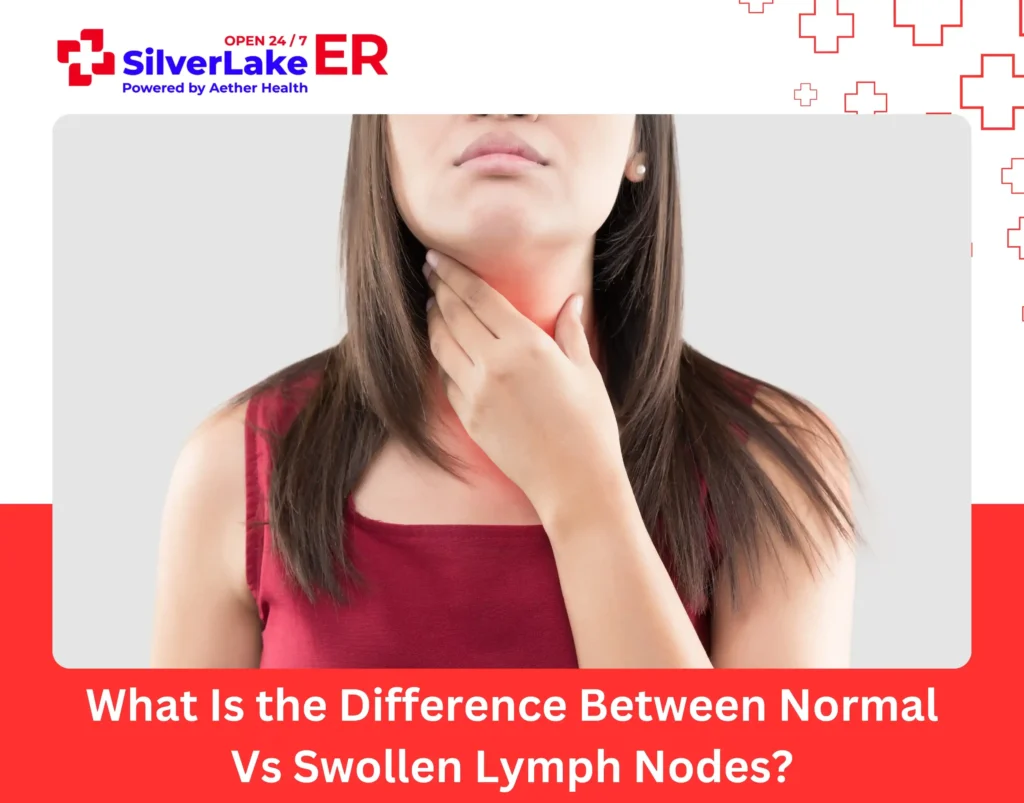Swollen lymph nodes are sometimes harmless, but other times they’re a sign of serious health issues like cancer. A tender bump under your jaw, behind your ears, or in your neck is never something to ignore.
We’ve seen patients who later wished they had recognized the warning signs sooner. If the swelling is from cancer, autoimmune disease, or a long-term infection, early diagnosis gives you more choices in treatment and better odds of success.
So, let’s break down what causes swollen lymph nodes, which symptoms to watch for, and when it’s time to seek medical attention.
What Are Lymph Nodes?

Lymph nodes are small, bean-shaped glands that are part of your lymphatic system (a crucial part of your immune system). These nodes are scattered throughout your body, especially in your neck, armpits, and groin. Their job? To filter out harmful substances and help fight infections before they spread throughout your system.
What Causes Swollen Lymph Nodes? 5 Common Causes
These are the most common causes of swollen lymph nodes:
1. Infections (Most Common Cause)
Most of the time, swollen lymph nodes are caused by an infection, usually viral or bacterial. For example:
- Common Cold or Flu: Swelling in the neck or under the jaw is common.
- Ear Infections: Lymph nodes near the ear may become tender.
- Strep Throat: Causes nodes under the jaw or neck to swell.
- Tooth or Gum Infections: Can cause nearby lymph nodes to enlarge.
- Mononucleosis : Causes widespread lymph node swelling.
2. Skin or Wound Infections
If you have a skin injury or wound that gets infected, nearby lymph nodes may swell as part of the body’s natural immune response.
3. Autoimmune Diseases
Conditions like lupus or rheumatoid arthritis can cause chronic inflammation, which may lead to enlarged lymph nodes.
4. Medications
Certain medications, such as anti-seizure drugs or those used to prevent malaria, may trigger lymph node swelling as a side effect.
5. Cancer
Cancers can also cause lymph nodes to swell. This includes:
- Lymphoma (cancer of the lymphatic system)
- Leukemia (cancer of the blood and bone marrow)
- Metastatic cancers that have spread to the lymph nodes from other parts of the body (e.g., breast, lung)
What Is the Difference Between Normal Vs Swollen Lymph Nodes?

Knowing the difference between a normal and a swollen lymph node can help you recognize early signs of illness and seek timely treatment.
Here’s how a normal lymph node typically looks and feels:
- Size: About the size of a pea or smaller (under 1 cm)
- Texture: Soft or rubbery (not hard)
- Movement: They move a little when you press them (like a jelly bean under the skin)
- Pain: No pain or tenderness
- Visibility: You probably won’t even see or feel them unless you’re super thin or checking carefully
Here’s how to identify a swollen lymph node:
- Size: Bigger—often more than 1 cm (like a marble, grape, or larger)
- Texture: Firmer or rubbery; sometimes hard
- Movement: May feel stuck in place and not move easily
- Pain: Might be tender or sore, especially when you touch it or turn your head
- Appearance: In some cases, you can actually see the lump bulging under the skin
Warm/red skin: If infected, the skin over it might feel hot or look red
Symptoms That May Accompany Swollen Lymph Nodes
Other accompanying symptoms of swollen lymph nodes may include:
- Fever
- Sore throat
- Runny nose
- Fatigue
- Night sweats
- General body aches
- Skin redness near the swollen node
When to See a Doctor for Swollen Lymph Nodes
Once you understand what causes swollen lymph nodes, keep an eye out for these warning signs:
- Swelling that lasts more than 2–3 weeks
- Nodes that are larger than 1 inch, hard, or don’t move
- Accompanying high fever or unexplained weight loss
- Persistent night sweats or fatigue
- Nodes near your collarbone or lower neck (which are more concerning)
What Causes Swollen Lymph Nodes? Diagnosis and Treatment

Your doctor will start by asking about your symptoms and performing a physical exam. If needed, additional tests like blood work, imaging (ultrasound or CT scan), or a lymph node biopsy may be ordered. Treatment depends on the underlying cause:
- Infections: Antibiotics or antiviral medication
- Autoimmune diseases: Immune-modulating drugs
- Cancer: Chemotherapy, radiation, or surgery
What Causes Swollen Lymph Nodes? Home Care Tips
For mild cases, especially those caused by a cold or flu, you can manage symptoms at home:
- Apply a warm compress to the swollen area
- Rest and stay hydrated
- Take over-the-counter pain relievers like ibuprofen
- Avoid touching or massaging the swollen node repeatedly
Final Thoughts
Knowing what causes swollen lymph nodes is important, but it’s not enough. Get checked at the nearest emergency room if you notice any of the symptoms mentioned above.
At Silver Lake ER, our team is here for you 24/7 with advanced diagnostic imaging, and experienced emergency care. Whether it turns out to be something serious or (hopefully) a minor infection, getting your swollen lymph nodes checked can give you the peace of mind you deserve.
FAQs:
1. How long do swollen lymph nodes usually last?
If due to a mild infection, they often shrink within 1–2 weeks. If they persist longer, see a doctor.
2. Can stress cause swollen lymph nodes?
Stress doesn’t directly cause lymph node swelling, but it can weaken your immune system, increasing infection risk.
3. Are swollen lymph nodes always painful?
No. Some are tender, while others (especially cancer-related) may be painless.
4. Do swollen lymph nodes always mean cancer?
No. Most are caused by infections. Cancer is a less common but more serious cause.
5. Can allergies cause lymph nodes to swell?
Yes, allergies may cause mild swelling due to immune system activation, but it’s not as common as infections.




